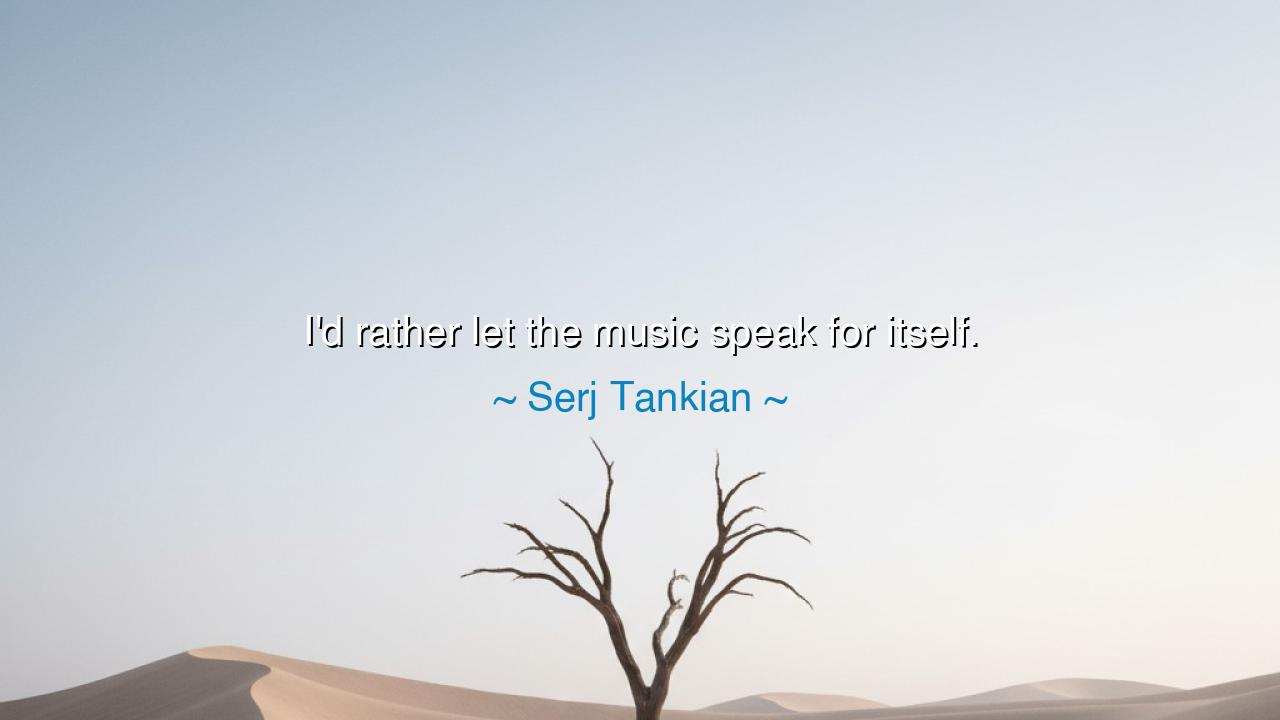
I'd rather let the music speak for itself.






Serj Tankian, a voice of fire and conscience, once said: “I’d rather let the music speak for itself.” These words shine with the wisdom of the ancients, for they remind us that there are truths too deep, too vast, too sacred for ordinary speech. Words may falter, arguments may twist, but music—pure, unchained—has a power that pierces the heart without explanation. In this, Tankian stands in a long line of poets, prophets, and sages who understood that the most profound messages are not spoken, but sung.
What does it mean to let the music speak? It means to trust in art as its own language, needing no interpreter. For words can be deceived, twisted by the clever, or dulled by overuse. But music moves in a realm beyond reason. The drumbeat speaks to the body. The melody speaks to the heart. The harmony speaks to the soul. Thus, when Tankian declares this, he teaches us that true power lies not in endless explanation, but in the living breath of creation itself.
The ancients knew this. In the temples of Greece, the lyre and the flute were not ornaments, but sacred voices. Pythagoras himself believed that numbers—the foundation of all reason—were first revealed through the harmonies of music. Even the prophets of Israel sang their psalms rather than merely speaking them, for song reached where speech could not. Tankian’s words echo these truths: that sometimes the highest wisdom cannot be explained, only experienced.
Consider the story of Beethoven. Deaf in his later years, he could no longer explain his symphonies with words, nor even hear them with his ears. Yet when he raised his hands to conduct, the Ninth Symphony thundered into the world. No speech could have delivered its meaning, no lecture could have conveyed its power. The audience was lifted into rapture because the music spoke directly, bypassing reason, straight into spirit. In that moment, the composer’s silence became louder than a thousand words.
Tankian himself, in his art, embodies this principle. His songs, often fierce and filled with protest, carry messages about war, injustice, and the human condition. Yet he chooses not to endlessly explain, not to dilute the fire with commentary. Instead, he lets the music—with its rage, its sorrow, its beauty—carry the message. In doing so, he teaches us that sometimes silence from the lips is not weakness, but strength, for the art speaks louder than the artist.
The lesson, then, is this: learn to trust the power of what you create, what you do, and what you embody. Do not always rush to justify yourself with words. Let your work, your deeds, your music, your character, speak in your place. The tree does not argue that it is alive—it simply blossoms. The river does not proclaim that it flows—it simply moves. In the same way, your actions and creations, when true, need no endless defense.
Practical wisdom follows: when you create, pour your soul into the work itself. Do not craft only for applause or explanation, but let the creation be whole and alive, needing no excuse. When you act in goodness, let your action speak louder than your boasting. When you love, let your presence declare it more than your tongue. Live so that your life, like Tankian’s music, can stand as its own testimony.
So remember the words: “I’d rather let the music speak for itself.” In them lies a truth for all times—that the deepest messages need no decoration, only authenticity. Trust your art, trust your actions, trust your truth. For when they are pure, they will speak louder than anything the tongue could ever say, and they will echo across the ages like a song carried on the eternal wind.






AAdministratorAdministrator
Welcome, honored guests. Please leave a comment, we will respond soon